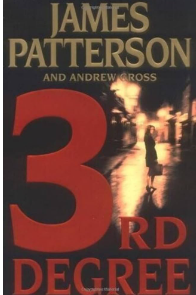James Patterson and Andrew Gross’s Third Degree is easily one of the most gripping mystery and thriller novels in print. It is the third entry in Patterson’s Women’s Murder Club series, but still approachable for newcomers. Although published in 2004, the book has lost none of its potency over the past 20 years.
The story begins with a literal bang: our hero, San Diego homicide detective Lieutenant Lindsay Boxer, witnesses an explosion at a luxury apartment while out jogging. It soon becomes clear that the apartment was bombed by August Spies, an extremist group with a blood grudge against big business–including the wealthy corporate executive killed in the blast. As August Spies’ reign of terror progresses, Lindsay and her allies, the ragtag “Women’s Murder Club” (city coroner Claire, Assistant District Attorney Jill, and reporter Cindy), race to avert the group’s brutal endgame.
On that note, the August Spies group bears deeper consideration as a case study of anti-establishment beliefs. In a move that may help readers understand and fear them, the terrorists view the world through a similar lens to modern-day conspiracy theorists. Their “elites” of choice control every facet of life from behind the scenes; outside media sources that criticize their violence are tools of the enemy, running a smear campaign against them. Certain chapters are written from the perspective of Michelle, a genuinely idealistic member of August Spies who either doesn’t realize, or doesn’t want to admit, how dangerous her comrades are–including her abusive, manipulative boyfriend, group leader Mal. Third Degree takes the time to examine what kinds of people actually take part in resisting the social order. If they were left unchecked, would they really create a better world?
That said, the heroes of Third Degree are as compelling as the villains. This book is full of conflicts both material and emotional, crystallizing the protagonist’s inner life in a way other novels might not. Along with trying to keep up with August Spies, Lindsay Boxer must help her friend Jill escape an abusive marriage, and decide whether to embrace her feelings for Homeland Security Department deputy Andrew Molinari (in San Francisco to help catch the terrorists). I appreciated the authors’ depictions of supportive female friendships; of the nuances of being in an abusive relationship; and of a male character like Molinari, who has unwavering faith in Lindsay’s abilities and judgment.
With four-page-at-most chapters, most of which end on a cliffhanger, Patterson and Gross gallop through their story–pacing themselves excellently, but never losing steam. Lindsay’s first-person narration tells much of the tale, and though her voice is matter-of-fact, the audience also shares in the jokes, serious conversations with her friends, and other emotional aspects in her life. Similarly, we unravel the mystery of what August Spies is and where they will strike next as Lindsay does, so that readers are kept as much on their toes as the hero. The plot takes a number of twists: some that readers might expect, others they certainly will not.
As one might expect, writing only three years after the September 11, 2001 terrorist attacks, Patterson and Gross treat the U.S. government with less nuance than modern readers might prefer. The hero of the book is a police officer battling a fanatical anti-capitalist extremist group; meanwhile, real life police violence and the abuses of corporations with no restrictions on them are increasingly on the minds of Americans. At times, the novel may feel chest-thumping, painting voices of opposition to big business as pugnacious and holier-than-thou. Yet for all of that, Third Degree is still a well-crafted novel that makes worthy points about the dangers of revolution and how well-meaning people can ultimately do more damage than good. This book is an action movie on paper, compelling from start to finish. Pick it up now, and let the story set your mind alight.









